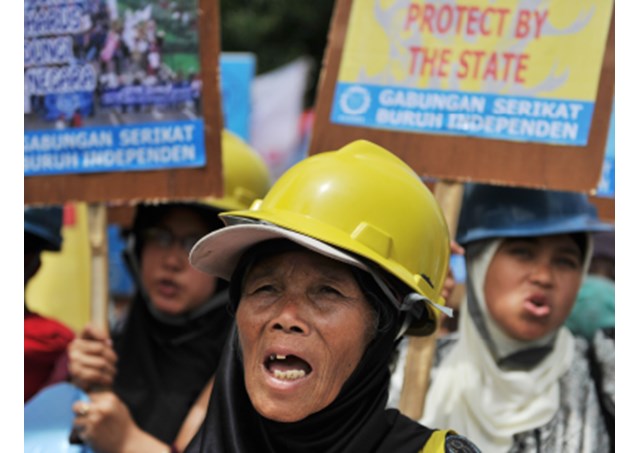
Indonesia: Survey reveals disappointing results in promotion of human rights

(Vatican Radio) Indonesian President Joko Widodo's administration has failed to promote human rights since taking office more than a year ago, according to a survey by the Setara Institute for Democracy and Peace.
The survey — released Dec. 9 — a day ahead of Human Rights Day, said the achievement index for human rights promotion fell slightly this year from an already-low 2.49 to 2.45. The survey scores range from zero to a high of seven. The study, which was conducted from Nov. 5 to Dec. 5, involved 215 respondents in 19 provinces.
"This shows that there have been no changes during the administration of President Widodo, even though he promised to protect human rights. The results are not surprising because human rights issues have evidently not been a priority in the Jokowi-JK administration,” said Setara Institute deputy chairman Bonar Tigor Naipospos, referring to Jokowi and Vice President Jusuf Kalla, during the survey's launch in Jakarta.
According to Bonar, the promise made during the election campaign was not reflected in a number of government documents, including the National Mid-Term Development Plan (RPJMN), the National Plan of Action on Human Rights (RANHAM) and the Government Working Plan (RKP).
Setara research director Ismail Hasani said that respondents, who consisted of human rights experts and activists, were disappointed that human rights protection was not outlined in Jokowi’s Nawa Cita (nine agenda) development principles and at the failure to set up a special commission on past human right abuses that was initially proposed.
Instead, Bonar explained, the government has been inconsistent in the matter and has neglected to bring to light the truth in regards to these issues, such as by restricting discussions on the 1965 communist purge and questioning every move by the public to demand full disclosure.
The survey graded Indonesia on a number of controversial issues such as human rights abuses and protection, abolition of the death penalty, safeguarding freedom of expression, association and religion and economic issues.
Ismail said the executions of convicted foreign drug offenders earlier this year had negatively impacted diplomatic relations on the human rights front within the international realm and therefore affected the protection of Indonesian citizens on death row abroad, he explained.
However, Ismail continued, there were also some improvements, such as a rise in economic, social and cultural rights that went up from 2.99 to 3.22 in the past year. Ismail said the study showed that Jokowi was leaning too much toward infrastructure development while neglecting human rights issues.
While most variables showed performance decreases across the board, the survey showed improvements in the economy, Naipospos said.
"Based on this data, Widodo's administration still prioritizes the economic and infrastructural developments and ignores the issues of human rights," he said.
"It must be balanced though. It cannot focus on one sector only and forget others," he said.
Setara national committee secretary, Father Antonius Benny Susetyo, urged for a balanced approach from the government, adding that upholding human rights and democratic values would also promote economic growth.
There is a need to break ties to the past, Benny said, adding that it was necessary for the government to own up to past failures. He also said the President should not be afraid to ignore politicians in his circle that had conflicts of interest in order to experience real growth in the promotion and protection of human rights.
According to Susetyo, "many political parties supporting the president are perpetrators of past human rights violations." This has contributed to Widodo's failure in human rights protection and enforcement, he said.
Father Susetyo also cited human rights violations in Papua as an example of where the current administration has failed. Widodo expressed a willingness to address persistent abuses in the province, "but officials surrounding him don't follow his lead," he said.
In Jayapura, the Papuan capital, about 300 priests, nuns, seminarians and university students held a silent protest in front of the local legislators' office to mark Human Rights Day on Dec. 10.
"Stop the violence and killings in this land [of Papua]. Stop the killings of the Papuan people," Father Neles Tebay, coordinator of the Papua Peace Network, told ucanews.com.
Last year, on Dec. 8, four students died and many others were injured when security forces allegedly opened fire on a crowd of protesters. The crowd gathered to protest against the beating of a child — allegedly by soldiers — in Ipakije village the night before.
(Source: UCANews.com; Jakarta Post)
| All the contents on this site are copyrighted ©. |


